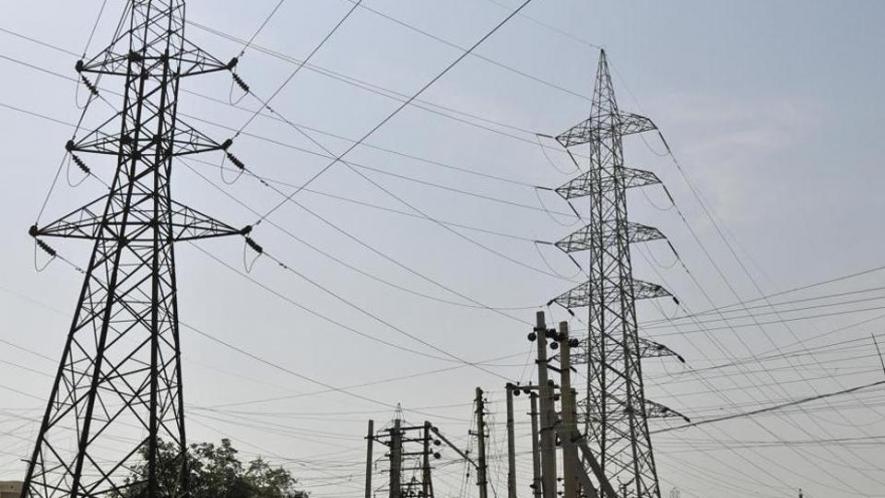Power Sector Employees in Uttar Pradesh Begin Fight Against Privatisation of Electricity Distribution

Even as power sector employees across India have been protesting against the Electricity (Amendment) Bill 2014 — which seeks to extend privatisation to power distribution — the Uttar Pradesh government has already initiated the process to privatise the distribution of electricity, drawing a sharp reaction from the state’s power employees.
The Uttar Pradesh Power Corporation Limited (UPPCL) has floated tenders in seven districts inviting bidders to take over the activities of giving out new power connections, installing the meter, meter reading, changing the meter, issuing bills and collecting the revenue. Meanwhile, the maintenance of the network infrastructure will be done by the government.
Protesting against the state government’s move, the UP power sector employees have threatened to go on an indefinite strike if this process of privatisation is not rolled back. They have come together under the banner of ‘Power Employees’ Joint Action Committee’ (PEJAC).
On 28 February, power employees held a day-long protest demonstration at the UPPCL headquarters in Lucknow — while UPPCL was holding a pre-bid conference with prospective bidders in the seven districts.
UP govt.’s move is similar to what the Electricity (Amendment) Bill 2014 proposes — to bifurcate the distribution function into carriage and supply. So while a government company would lay down the wires, private companies would compete over selling the electricity to consumers and earn profits.
The UPPCL has floated the tenders inviting the private companies — to be called ‘Integrated Service Providers’ (ISPs) — in the districts of Etawah, Kannauj, Orai, Rae Bareli, Saharanpur, Mau and Ballia. The tenders are slated to be opened on 5 March while the process of awarding the contracts to the ISPs is to be completed by 28 March. It has said that the appointment of ISPs is meant to generate higher revenues in loss-making divisions.
“This move by the UP government is a rehearsal of the electricity amendment Bill,” said Shailendra Dubey, convener of PEJAC and chairman of All India Power Engineers’ Federation, while speaking to Newsclick.
“The only difference between the amendment Bill and this move is that the Bill provides for service providers to purchase the electricity as well. But since the Act does not allow that as of yet, so here the government company will purchase the electricity and five it to the ISPs.”
Dubey also pointed out that only seven bidders for the seven districts had turned up for the pre-bid meet, which means that the ISPs who would get the contracts were pre-decided by the government.
“We met the chairman of UPPCL, Alok Kumar, during the massive protest on 28 February. He asked us to submit in writing our objections and viewpoint within the next 8 to 10 days,” said Dubey.
“The chairman also said that the government is only outsourcing some activities, not privatising. But we pointed out that outsourcing amounts to privatisation only.”
If the tenders are not recalled, the power employees in the state would begin an indefinite strike, he said.
Earlier in February, state energy minister Shrikant Sharma had said in the state assembly that distribution-related activities were merely being outsourced to various companies, as many of the commercial activities already were, and that was no plan to privatise distribution.
Sharma had also clarified, as per news agency UNI that the activity of revising the electricity bills, in case of incorrect bills, would be done by the executive engineers only and would not be outsourced.
However, as Dubey told Newsclick, “The revision of bill would need the permission of the executive engineer. But since all other activities would be carried out by the ISPs, in practice it would amount to the executive engineer merely accepting whatever the service provider is handing over, as the executive engineer would not be involved in the billing process at all.”
Dubey also said the government was likely to try and push through the amendment Bill in the upcoming second phase of the Budget Session of Parliament, which begins on 5 March.
And the power employees are getting ready to battle it out. Whenever the government attempts to pass the amendment Bill, the power sector employees across the country would go on strike. A national call for the same has already been issued, Dubey said.
On 14 March, power employees have planned a nationwide protest rally in all state capitals on 14 March to protest against the amendment Bill. On April 3, a massive protest rally will be held in Delhi by electricity employees from all over the country.
The countrywide protest actions by the electricity workers and engineers are being coordinated by the National Coordination Committee of Electricity Employees and Engineers — a joint platform of all unions and federations in the power sector with more than 2.5 million members.
Get the latest reports & analysis with people's perspective on Protests, movements & deep analytical videos, discussions of the current affairs in your Telegram app. Subscribe to NewsClick's Telegram channel & get Real-Time updates on stories, as they get published on our website.
























